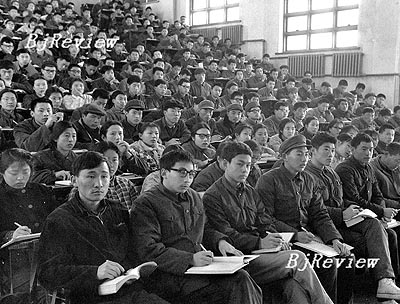
Wang Xiaoying, a female Chinese writer: I was 26 in 1978, the second year after 1977 when China resumed the college entrance exam system that was halted during the Cultural Revolution (1966-76). At that time I was already doing a pretty good job, but I still made up my mind to sign up for the exam. I didn't fear it so much as today's examinees do, and the test result came out well.
I think I owe much to the college entrance exam as it's fortunate for one to pass a test to give play to one's talents. It's not the fault of the exam system but the attitude of the many students and their parents that should be changed concerning the so called "exam panic." Actually the exam has something in common with the Olympic spirit: to be entrepreneurial and confident to develop one's potentials.
My daughter was supposed to take the big exam this year but she's quite independent and doesn't want any help from us. She chose to pursue overseas study and now she has been accepted by Yale.
Wang Tianyun, Vice-President of the Shanghai Film Group Corporation (SFG): I immediately became a chemical factory worker after I graduated from middle school in 1966. But I had that strong desire in my heart: I wanted to go to college!
When I signed up for the test in 1978, I was already a leader of some 140 workers in a workshop. Learning that I was to take the exam, many of my colleagues disagreed and asked me to give up as at that time intellectuals were not considered respectable. Nevertheless, I was determined, and finally I made it.
In my four years of college time I studied literary theories, took art lessons and listened to many science courses. The exam had totally changed my destiny and I'm here to say that I'm a direct beneficiary of the exam.
Speaking of my son, who has been good at writing since very young, he made a big decision before the college entrance exam: to ignore humanities for science, because in his mind science was what a boy was supposed to learn. But his mother and I preferred him to study law. Anyway, he was old enough to make his own choice so we just decided to let him go.
When he went to college, one day he came back home and told us that he had decided to sleep in the daytime and write a screenplay at night. We were surprised but he insisted that this was the only way that would lead to success for him. I didn't say much, I just gave him the go ahead as I felt that his way might work. It finally turned out that his play was made into a film, My Sun, depicting a college life story and it has been shown in many places across the country.
Ye Zi, a newspaper columnist: I went to work on a farm after I graduated from middle school. Afterwards, there was a lack of teachers in Shanghai and that was an opportunity for me. After a short period of training I became a teacher. When the high entrance exam was restored I wanted to take it but the school where I taught didn't allow me to go for it for certain reasons. I missed the chance, but I chose to learn what was taught in college all by myself.
My daughter was luckier and she did pretty well in the exam, which got her in to study economics at the reputed Fudan University. But after one month she told me that she was not interested in economics, so she wanted to quit school and take the exam again next year to choose another major. I convinced her that was just impulsive and asked her to think again. After consulting other students on the future major, which was not so interesting as she had thought, she gave up the idea and resumed college.
As she moved to the third year in college, my daughter again wanted to quit for one year to head for Tibet to experience a different life. She stayed in Tibet for more than half a year, during which her mother and I were worried about her, but we knew we couldn't stop her.
After a year, she came back and resumed school. Something in her had changed. She began to have a strong interest in culture. She said to me at the time of college graduation, "Dad, I love to study culture, and I want to pursue a postgraduate study in Shanghai Theater Academy." Now she is a student there as she wished. | 